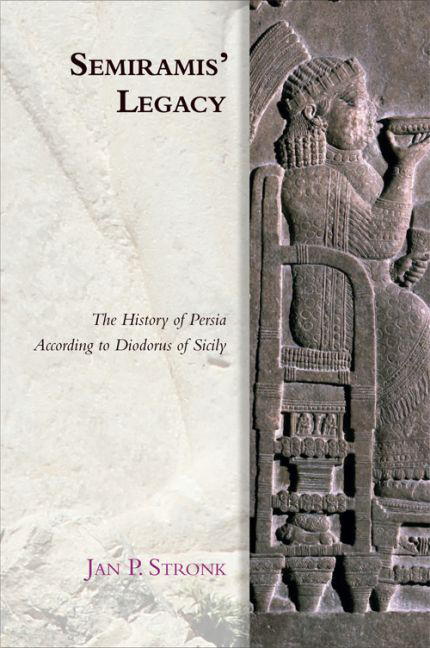Book contents
- Frontmatter
- Contents
- List of Figures and Tables
- Preface
- Abbreviations
- Series Editor's Preface
- Map
- Introduction: Diodorus' Work and Our Sources
- 1 Diodorus’ Sources
- 2 Ancient History: Assyrians, Chaldeans, and Medes
- 3 The Persians and the Greek Wars
- 4 Revolt and Sedition
- 5 Alexander the Great Defeats Darius III
- 6 From Persepolis to Babylon
- 7 The Period of the Diadochs: The Rift Opens
- 8 The Period of the Diadochs: The Rift Deepens
- 9 The Vicissitudes of the Diadoch Kingdoms: The Final Years of Diodorus' Persian Account
- 10 Semiramis' Legacy
- Conclusion
- Bibliography
- Index of Classical Sources
- Index of Modern Authors
- General Index
7 - The Period of the Diadochs: The Rift Opens
Published online by Cambridge University Press: 10 May 2017
- Frontmatter
- Contents
- List of Figures and Tables
- Preface
- Abbreviations
- Series Editor's Preface
- Map
- Introduction: Diodorus' Work and Our Sources
- 1 Diodorus’ Sources
- 2 Ancient History: Assyrians, Chaldeans, and Medes
- 3 The Persians and the Greek Wars
- 4 Revolt and Sedition
- 5 Alexander the Great Defeats Darius III
- 6 From Persepolis to Babylon
- 7 The Period of the Diadochs: The Rift Opens
- 8 The Period of the Diadochs: The Rift Deepens
- 9 The Vicissitudes of the Diadoch Kingdoms: The Final Years of Diodorus' Persian Account
- 10 Semiramis' Legacy
- Conclusion
- Bibliography
- Index of Classical Sources
- Index of Modern Authors
- General Index
Summary
THE YEARS 323/ 2–318/ 17
S. 123:
18.2.1–4.8:
Division of Alexander's empire:
(18.2.1) When Cephisodorus was archon at Athens [323/2], the Romans elected Lucius Frurius and Decius Junius consuls. During their term the throne was vacant, because Alexander the king had died childless, and great contention arose over the leadership. The phalanx of the infantry supported Arrhidaeus, son of Philip II, for the kingship, though he was afflicted with incurable mental disorders. The most influential of the companions and of the bodyguard, however, taking counsel together and joining to themselves the corps of horsemen known as the companion cavalry, at first decided not to take up arms against the phalanx and sent envoys chosen from men of rank, of whom the most prominent was Meleager, to the infantry, asking them to submit to their orders. However, when Meleager came to the men of the phalanx, he made no mention of his mission whatsoever but, on the contrary, after praising them for their decisions, sharpened their anger against their opponents. Therefore the Macedonians of the phalanx, after instating Meleager as their leader, advanced under arms against those who disagreed with them. As the bodyguards had withdrawn from Babylon and were making ready for war, the most accomplished of the men persuaded the parties to come to an agreement. Straightaway they instated as king Arrhidaeus, son of Philip II, and changed his name to Philip III, but they instated Perdiccas, to whom Alexander had given his ring as he died, as an epimeletes [‘curator’] of the kingdom, and they decided that the most important of the companions and of the bodyguard should take over the satrapies and obey both Philip and Perdiccas. (18.3.1) After the latter had assumed the supreme command and had taken counsel with the commanders, he gave Egypt to Ptolemy, son of Lagus; Syria to Laomedon of Mytilene; Cilicia to Philotas; and Media to Peithon. To Eumenes he gave Paphlagonia and Cappadocia and all the lands bordering on these, which Alexander did not invade, having been prevented by the urgency of his affairs when he was carrying on the war with Darius; to Antigonus he gave Pamphylia, Lycia, and what is called Great Phrygia; then to Asander Caria; to Menander Lydia; to Leonnatus Hellespontine Phrygia.
- Type
- Chapter
- Information
- Semiramis' LegacyThe History of Persia According to Diodorus of Sicily, pp. 383 - 417Publisher: Edinburgh University PressPrint publication year: 2017



